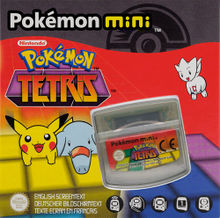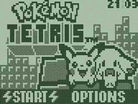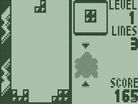Pokémon Tetris: Difference between revisions
Add table styles |
No edit summary |
||
| Line 168: | Line 168: | ||
==External links== | ==External links== | ||
*''[http://bulbapedia.bulbagarden.net/wiki/Pokémon_Tetris Pokémon Tetris]'' at Bulbapedia | *''[http://bulbapedia.bulbagarden.net/wiki/Pokémon_Tetris Pokémon Tetris]'' at Bulbapedia | ||
=== Gameplay videos === | |||
*[https://www.youtube.com/watch?v=Kw8XdKb_1NE ''Video demonstrating shock mechanic''] | *[https://www.youtube.com/watch?v=Kw8XdKb_1NE ''Video demonstrating shock mechanic''] | ||
*[http://www.youtube.com/watch?v=jhUdkhigXPU ''Pokemon Tetris - Complete Pokedex!''] | *[http://www.youtube.com/watch?v=jhUdkhigXPU ''Pokemon Tetris - Complete Pokedex!''] | ||
*[http://www.youtube.com/watch?v=zCVDTSRAPWY ''Pokémon Tetris 20 Lines''] (video demonstrates [[#20 Lines|20 Lines]] and [[#Hyper|Hyper]]) | *[http://www.youtube.com/watch?v=zCVDTSRAPWY ''Pokémon Tetris 20 Lines''] (video demonstrates [[#20 Lines|20 Lines]] and [[#Hyper|Hyper]]) | ||
*[http://www.youtube.com/watch?v=VylaM1qXbfY ''Pokémon Tetris Pyramid''] (video demonstrates [[#Pyramid|Pyramid]] and [[#Master|Master]]) | *[http://www.youtube.com/watch?v=VylaM1qXbfY ''Pokémon Tetris Pyramid''] (video demonstrates [[#Pyramid|Pyramid]] and [[#Master|Master]]) | ||
Revision as of 00:52, 18 December 2018
| Pokémon Tetris | |
|---|---|
 | |
| Developer(s) | Nintendo |
| Publisher(s) | Nintendo |
| Platform(s) | Pokémon Mini |
| Release | 15 Mar 2002 (EU) 21 Mar 2002 (JP) |
| Gameplay info | |
| Next pieces | 1 |
| Playfield size | 10w x 18h (16h visible) |
| Hold piece | No |
| Hard drop | Yes |
| Rotation system | rotation + reflection |
Pokémon Tetris (ポケモンショックテトリス Pokémon Shock Tetris) is a game released for the Pokémon mini. It was only released in Japan and Europe. It was classified by the ESRB as E for Everyone under the title Pokémon Mini Shock Tetris, but was never released in the United States. In addition to rotation, pieces can be reflected (L to J, S to Z, etc.) by shaking or hitting the Pokémon Mini's built-in motion sensor.
Gameplay
The game consists of several variations of the main game of Tetris with varying levels of difficulty. This game also allows the player to "flip" most bricks by shaking the Pokémon mini. In all one player and VS. games, a silhouette of a Pokémon will be shown on the right hand side of the screen; if the player can make a match of 4 or more lines, the Pokémon will be captured and added to the in-game Pokédex. The player has a limited time to capture the Pokémon before it is replaced by another one chosen at random.
Modes
Difficulty
There are five difficulty settings in the game:
Rookie
Only tetrominoes appear.
Normal
Pentominoes gradually start to appear along with tetrominoes as your level goes up.
Super
Pentominoes will begin to appear more quickly (than Normal) as the level increases.
Hyper
Pentominoes appear from the beginning along with tetrominoes. Hyper is unlocked by capturing 100 Pokémon.
Master
Only pentominoes appear. Master is unlocked by capturing 200 Pokémon.
1-player mode
Standard
Endless mode. The player keeps playing until the screen fills up with bricks. Can be played on all five difficulty settings.
20 Lines
This is a time attack mode timing how long it takes for the player to match 20 lines of bricks. Can only be played on Normal, Hyper, or Master difficulty. On Normal only Tetrominoes appear.
Pyramid
The player is timed to see how quickly they can clear one of every time of line combination, including one line (single), two lines (double), three lines (triple) and four lines (tetris). Can only be played on Normal, Hyper, or Master difficulty. On Normal only Tetrominoes appear. On Hyper and Master, you must also clear five lines.
VS. mode
This mode requires both players to have a copy of the game each. Multiplayer games are the same as single player with the change that when a player makes a line match, the other player receives more lines on their screen. Can only be played on Normal, Hyper, or Master difficulty.
Pokédex
249 Pokémon from Generation I and Generation II can be captured in this game. In this mode, the player can see which Pokémon they have caught. The Pokédex also shows both the Pokémon's number and the quantity captured. Up to three kinds of picture of each Pokémon can be viewed. Rarer Pokémon appear at higher difficulties and some only appear in certain game modes.
Scoring
| Level | Points for 1 line |
Points for 2 lines |
Points for 3 lines |
Points for 4 lines |
Points for 5 lines |
|---|---|---|---|---|---|
| 1 | 10 | 20 | 40 | 120 | 500 |
| 2 | 20 | 40 | 80 | 240 | 1000 |
| 3 | 30 | 60 | 120 | 360 | 1500 |
| ... | |||||
| 10 | 100 | 200 | 400 | 1200 | 5000 |
| n | 10 * n | 20 * n | 40 * n | 120 * n | 500 * n |
For each piece, the game also awards the number of points equal to the number of grid spaces that the player hard drops or continuously soft drops the piece. Unlike the points for lines, this does not increase per level.
External links
- Pokémon Tetris at Bulbapedia
Gameplay videos
- Video demonstrating shock mechanic
- Pokemon Tetris - Complete Pokedex!
- Pokémon Tetris 20 Lines (video demonstrates 20 Lines and Hyper)
- Pokémon Tetris Pyramid (video demonstrates Pyramid and Master)
| ||||||||||||||

